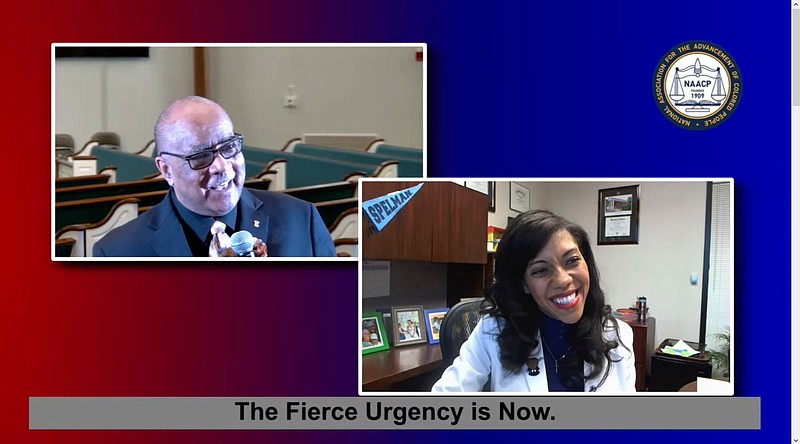TEXARKANA - With music, poetry, prayer and a full slate of speakers, the local branch of the NAACP celebrated Dr. Martin Luther King Jr. on Monday, the holiday set aside to honor him.
Under the theme "The Fierce Urgency of Now," the event encouraged continuing engagement and action to further King's legacy of struggling for social and racial justice. It culminated with a candle-lighting ceremony to memorialize King's six principles of nonviolence.
"The theme 'The Fierce Urgency of Now' is so befitting for the current state of our nation. We applaud all the previous efforts of every American to make a difference and to become change agents. We must set an example and leave a legacy for future generations just like Rev. Dr. Martin Luther King Jr. did for us," Lekia Jones said on behalf of her sorority, Alpha Kappa Alpha Inc.
The ongoing COVID-19 pandemic caused this year's MLK Day celebration to move online, avoiding a gathering that could have spread the disease. The pandemic also was central in the comments of guest speaker Dr. Loren Robinson, vice president of medical affairs at CHRISTUS St. Michael Health System, who focused her remarks on racial disparities in health care.
"We know that the disparities in negative impacts from COVID-19, from hospitalization rate to death rate to unemployment, to the longer-term effects of COVID-19 - mental health disparities, long-term disabilities - we know that our community is the face of COVID-19 statistics.
"While we're in the middle of this global pandemic of COVID-19, the solutions and actions to address this pandemic must come at a local level. For Texarkana and for our community, it means that we need to be active and engaged stakeholders in the COVID-19 response," Robinson said.
Robinson spoke about the distrust of the health care system among the Black community, referring to the infamous Tuskegee Experiments. For 40 years, the U.S. government infected Black residents of Tuskegee, Alabama, with syphilis without their knowledge or consent to observe the disease's effects on people who went untreated.
"The reason that there is distrust, as we know as a community, is because of systemic racism on behalf of the health care system in the United States that has deliberately been perpetrated against Black communities and other communities of color.
"I'm here to tell you that the fierce urgency of now is that we are in the middle of a pandemic. What do we need to do as a Black community to respond to this pandemic, and what can we do? For my part, I want to open this conversation, and in my role as the chief medical officer at the hospital, I consider it part of my official job duty and responsibility to connect with our community, to ensure health equity for Texarkana.
"This means that Black and brown faces who are interested should be represented in these vaccine lines. This means answering difficult questions about the real history, past and present, of systemic racism in health care. The Black community has distrusted the health care system for a reason, and for a good reason. But now is our turn to take it back.
"Now is our time to look at ourselves in the mirror and say, 'Yes, there has been a dark past that has taught us, but it has taught us faith. And now that we are in this new present, facing this new day with strength and with hope, we are part of this legacy. We are part of a community that marches on.' I hope that you will join me and march on until victory is won," Robinson said.
Recent events other than the pandemic also should inspire recommitment to King's vision, said Dr. James Anthony Morris, pastor of Hamilton Memorial AME Church.
"After witnessing the insurrection on Jan. 6 of this year at the heart of our democracy, the United States Capitol, by domestic terrorists who were attempting to overthrow the will of the people and discredit a fair election, we know that Dr. King's work and the work of the NAACP is needed now more than ever. Dr. King stated in his speeches and writings, 'Injustice anywhere is a threat to justice everywhere. The time is always right to do what is right,'" Morris said.
The event ended with a call to participate in the NAACP's local activism.
"The NAACP has been in the trenches battling and advocating for well over a century to advance justice for all, which includes being at the forefront of voter right cases across the country to fight against Black and brown voter disenfranchisement and voter suppression, and to eliminate barriers of racial discrimination and hatred, and to ensure the health and well-being of all persons.
"We are all in some very challenging times, but with your help and support, we can be the game-changers for our community. It has been stated we must be the change that we wish to see," Cassandra Rhone said. "History has taught us that the road to justice is long and hard, but we all have the power to continue chipping away at those injustices."

